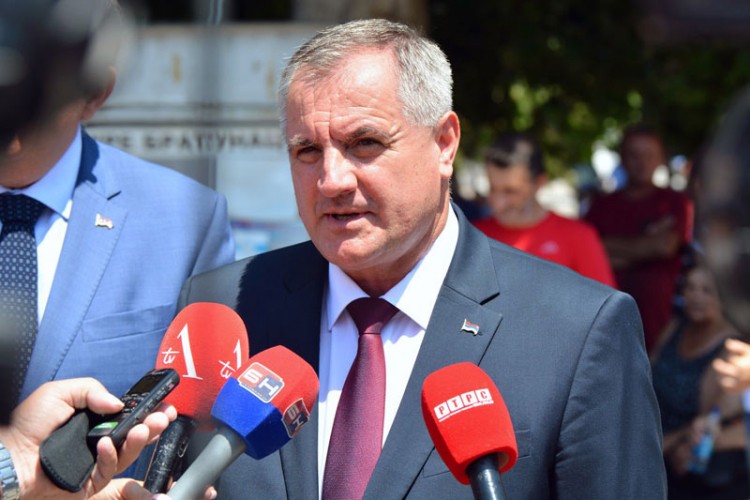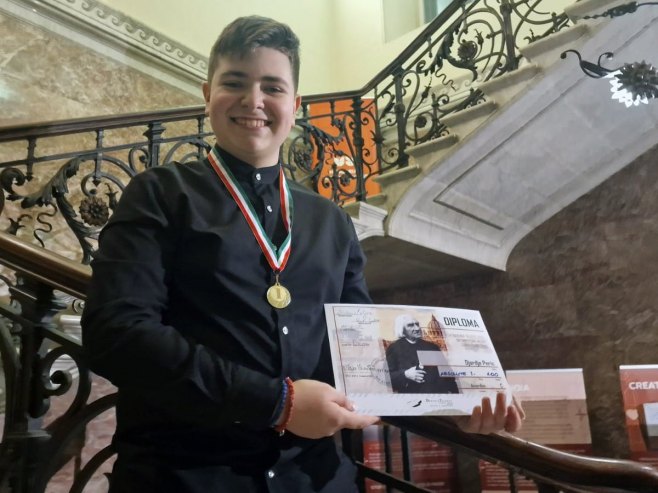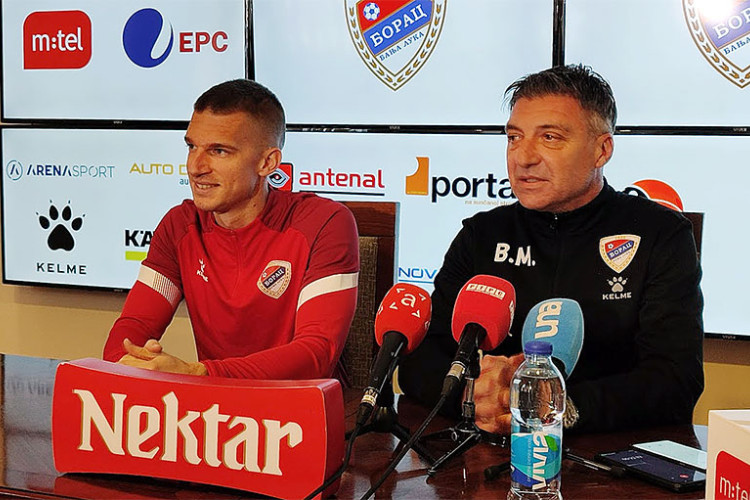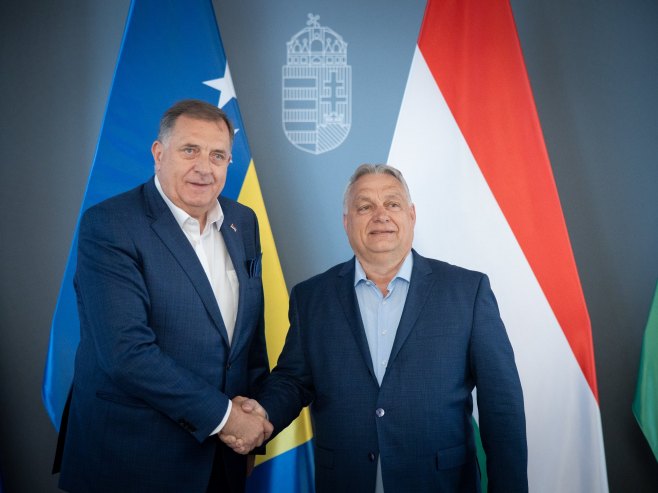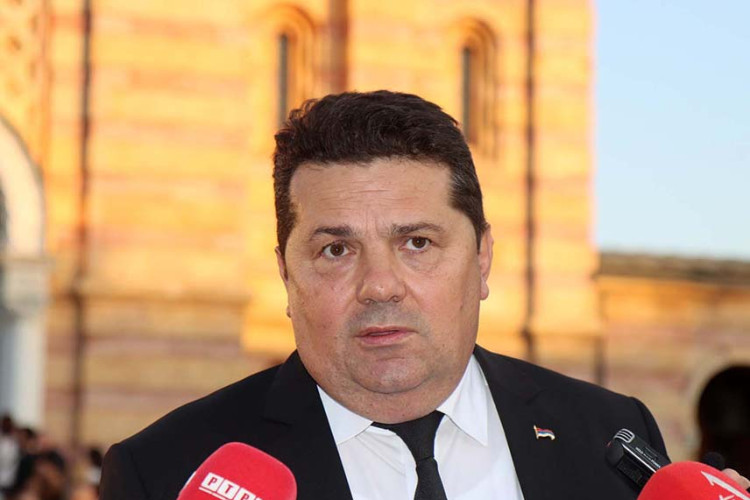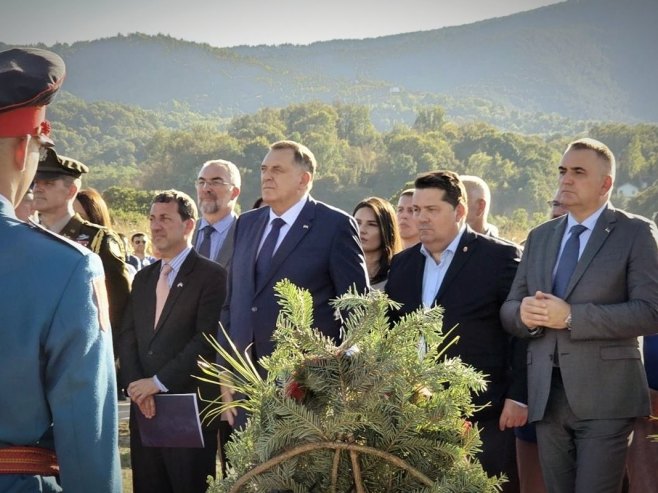The adoption of the Srebrenica resolution in this manner may even mark the beginning of the end of the United Nations as we know it. It has become evident that this is now a space of lobbying and interest spheres where international law is trampled upon, said Radovan Višković, Prime Minister of Republika Srpska, in an interview with Banjaluka.net, discussing the announcement of the Srebrenica resolution adoption at the UN General Assembly session.
- This resolution means nothing in a historical sense, but in a political sense, it represents a significant problem because it will disrupt relations within BiH – said Prime Minister Višković.
The vote is scheduled for May 23. The government has sent its report to the UN Security Council, as well as the Report of the Independent International Commission on the Suffering of All Peoples in Srebrenica during 1992-1995. What do you expect, and what consequences will this have?
VIŠKOVIĆ: The burden of genocidal accusation that this resolution carries will be borne by every Serb regardless of where they are. And this is something that all Serbs around the world should understand.
This does not only concern Serbs from Republika Srpska but all of them. Firstly, I want to thank Serbia for its understanding and diplomatic efforts. Particularly to President Vučić and his team. He has already visited New York twice, where he lobbied and held dozens of meetings with representatives of numerous countries.
However, this is a political story. Where Serbia succeeds in lobbying, the Germans follow and try to spoil it. So, you see there is a political interest to wash their biography clean.
At one point, I said that this might even be the beginning of the end of the United Nations as we know it. It has become clear that this is now a space of lobbying and interest spheres where international law is trampled upon.
A month ago, voting rules were changed precisely to avoid a fiasco during the vote. It has always been that abstentions were added to the ‘against’. If the sum of abstentions and ‘against’ is greater than ‘for’, no document can be adopted. So, if 193 countries have the right to vote, they need 97 votes for a simple majority. They don’t have it. They won’t have it by May 23. Today, it is said that about 80 countries will vote ‘for’.
What I want to emphasize is that all resolutions related to genocide were adopted unanimously. And that says something.
General Assembly resolutions are not binding, unlike UN Security Council resolutions. This resolution is more ceremonial. However, the Bosniak people and some hostile governments and countries towards Republika Srpska think that this resolution can be used for political purposes in the future.
What does that mean?
VIŠKOVIĆ: In the sense that Republika Srpska is declared genocidal, so they can seek its abolition, etc. We now have information that Montenegro’s second amendment, which states that Republika Srpska is unquestionable, was not adopted. The one stating individual responsibility was adopted. This means that Republika Srpska cannot be treated as genocidal. However, they played on the variant that after this resolution, they will attempt to abolish Srpska.
The government has also sent a report on the suffering of all peoples in the Srebrenica region from 1992 to 1995 by the Independent International Commission chaired by Gideon Greif.
VIŠKOVIĆ: The commission, which included some of the greatest authorities in the field dealing with genocide, determined that genocide did not occur there. And they covered the period from 1992 to 1995, not just a few days in July 1995. When the report was published, as the government, we made sure that the report reached all the ambassadors of UN member countries.
Whether any of them will read it, I’m not optimistic. It has more than 1,000 pages, but it is enough for them to read only the conclusion. They will understand how the numbers were manipulated. Some of the numbers of those buried today are actually alive. There are those who died before and after those events.
Also, the 28th Division of the so-called RBiH Army decided to break through from Srebrenica to Tuzla during that period, almost 80 kilometers through the territory controlled by the Army of Republika Srpska. In that breakthrough, about 2,300 people perished. Unfortunately, 1,200 of them lost their lives in ways not in accordance with existing conventions, and that is, in my opinion, a serious crime. A crime of an individual character, and most of those individuals have either been judged or are in court proceedings.
That resolution means nothing historically, but it represents a significant problem politically.
How so?
VIŠKOVIĆ: It can affect relations within BiH. Representatives from the other entity in joint institutions have abused their positions. The Serb member of the BiH Presidency, Željka Cvijanović, has rightly filed a number of criminal charges. The BiH ambassador to the UN cannot lobby for this document behind the back of the BiH Presidency, which is responsible for foreign policy.
We can even say that the Minister of Foreign Affairs, Elmedin Konaković, was likely aware of these developments but did not inform the BiH Presidency.
Probably members of the Presidency, Komšić and Bećirović, knew as well.
VIŠKOVIĆ: I can’t say for sure whether Komšić knew or not. Bećirović probably did. Bećirović has been staying in the US for some time now at the expense of BiH citizens, lobbying for the resolution. If he thinks he is lobbying for BiH’s future, he is wrong. They are causing more harm than good to BiH, even though they swear by BiH and its institutions.
General Assembly resolutions are non-binding, unlike UN Security Council resolutions, which are binding. However, we see a disregard for Security Council Resolution 1244 on Kosovo and Metohija by politicians from Sarajevo, who are also violating the official stance of BiH institutions in which they swear. Recently, some even voted for the admission of so-called Kosovo into the Council of Europe.
VIŠKOVIĆ: As I said before, this might even be the beginning of the end of the United Nations in its current form. This is such a gross violation of international law. They are cutting the branch they are sitting on. If you trample international law, on which the UN Charter is based, what have you achieved? You are dismantling that institution.
However, I am sure that after the elections taking place in Europe this year and the US elections at the end of the year, things will either deteriorate or be put in order and set right. I hope for the latter. We, as a people, must be wise, united as much as possible, and refrain from attacking each other over trivial matters.
We are a small boat in a global sea. And when there are big waves, you try to steer your boat, because it is not a cruiser, through to calm waters and a safe shore to save yourselves.
You said we are too small to influence this, we will see what happens after November and which direction the world takes. How can Republika Srpska maintain stability, peace, politically, economically, in every sense? How difficult is it to function under these conditions and what is the recipe to endure until perhaps better times?
VIŠKOVIĆ: As I said. We must be united, wise, and understand the situation we live in. We must not behave as if this is happening somewhere far away. We must not prioritize personal interest. The collective interest, which is the interest of Republika Srpska, must come first. We all need to try to preserve ourselves. And to do that, we must give up certain things, in the sense of not displaying arrogance and disrespect, but rather turning together and managing that boat I mentioned earlier together.
If you have more rowers who know how to handle the oars, your chances of survival are greater. If you are alone in that boat, no matter how you row, you will not fare well. That is why I called for our unity, to somehow forget who is the opposition, who is the government. Not to succumb to the influence of individuals who receive some amount of money and then spew and spit, whether true or not.
But how to maintain Republika Srpska economically? Sanctions have been imposed, pressure is being put on banks, and Republika Srpska recently lost a case with Viaduct, bringing the value of lost cases to 330 million BAM. How will this be resolved?
VIŠKOVIĆ: I’ll start with these cases, not wanting to defend or attack anyone. However, politics have interfered here as well, bringing up self-management agreements from 1979, 1983, and so on. Dozens of times in government sessions, I have asked – where are our self-management agreements so we can sue someone too?
And then you get the infamous answer. In those times, BiH was the poorest and could hardly help anyone; rather, it was helped by others. And now those others are emerging, imagine, 50 years later.
The moment was awaited for Republika Srpska to stand on its own economically, so they could appear with million-dollar compensation claims.
The Slovenian Electricity Company won an arbitration case for Ugljevik. We made a deal to deliver one-third of the energy, to pay the judged amount of around 67 million euros in 14 equal installments. And negotiations are still ongoing about some interest from 2022.
And then, following the same pattern, Croatia appears for Gacko.
I asked the relevant ministry, the electric company, and the attorney general’s office to either sit down and negotiate a peaceful resolution of that problem or prepare an arbitration lawsuit for Dubrovnik.
Because according to the same agreement they are referring to from that Yugoslavia period, HET had the right to certain energy from Dubrovnik, which it hasn’t received since the 1990s. We even consider that our compensation claim is heavier than what the Croats have in Gacko. We proposed to sit at the ministerial level, at the level of electric companies, and open this issue, saying we won’t insist here if you don’t insist there. To draw a gentlemanly line.
And Viaduct?
VIŠKOVIĆ: Viaduct is something I consider a mistake at that moment. I don’t want to delve into various speculations, stories. When I first received the arbitration decision from Belgrade that it was ruled in their favor, around the end of 2022, I asked then-Justice Minister Anton Kasipović to file a criminal complaint against unknown persons. To investigate who and how, consciously or unconsciously, under what circumstances, led to this damage of about 90 million BAM.
A few days ago, I asked the General Secretariat of the Government to contact the prosecutor’s office and ask for information on where that complaint is, in which phase.
So, the complaint was filed?
VIŠKOVIĆ: It was filed. We have all the documentation the government had at that time. I don’t want to delve into details, nor do I have the right, nor do I want to, nor can I. In the end, I’m not an investigative body, but we provided the documentation we had at that time.
And just to say, in that documentation, I saw a paper related to the hydroelectric plant on the Vrbas, which said that if any problems, costs, or damages arise, the hydroelectric plants on the Vrbas are obliged to cover them. I’m not happy that this judgment happened. The hydroelectric plants on the Vrbas are 100% owned by Republika Srpska through the electric power holding. So, it is less important who will pay that damage, but it is also important to see potential responsibility in the actions.
That’s precisely what people care about. Of course, you weren’t in politics during that period, but somehow there is always a lack of accountability for what happens. Everyone hopes that the judiciary will do its job.
VIŠKOVIĆ: I have no right to exert pressure or anything, but upon learning that there is that problem, I acted according to my powers as Prime Minister.
Finally, the relationship with the EU. The growth plan for the Balkans includes around a billion euros for BiH. 110 out of 113 requests have been met or aligned. However, the Union believes they must be fulfilled.
VIŠKOVIĆ: When those principles first arrived, we disagreed with about 40 of them, more than 30%. Believe me, sometimes I was so demanding towards my associates, ministers, not to reject things at first glance, not to accuse Srpska as a disruptive factor. Let’s negotiate. The working group lowered it below 30. After that, I got involved personally, and we reached three demands we can’t accept, about 98%. The Union told us that if we exceeded 95%, they would understand, support, and encourage us. We were told the funds would be reduced for what is not achieved. So, we would get 98% of the funds, and that makes sense to me.
We completed everything by April 30, sent it to Brussels, and on May 6, they replied that they were not satisfied with BiH’s progress because three principles were not aligned. I told them they were not being fair. If they had stated at the beginning that those three were their red line, we wouldn’t have negotiated. These 110 wouldn’t matter to me. What does the green agenda mean if the condition is the constitutional structure?
And what are those three specific principles? What were they asking from BiH, Republika Srpska?
VIŠKOVIĆ: The three unresolved issues are the service center in the services area. A single joint one in BiH, which is unconstitutional. That would mean if someone needs an ambulance, police, firefighters, they must call Sarajevo. How can someone in Prnjavor, Gradiška, Banja Luka have someone from Sarajevo send an ambulance, firefighters from Banja Luka? The jurisdiction of those emergency services lies with the entity, in the Federation even with the cantons. Our proposal was to have two centers, one for Republika Srpska and another for the Federation of BiH.
The second issue is the appointment of all Constitutional Court judges because two Serbs and one Croat are missing, and to ensure that Constitutional Court decisions are respected throughout the territory. They demand our people to be just a facade. We propose a law on the Constitutional Court to be adopted in the Parliamentary Assembly, where there will be no foreigners in the BiH Constitutional Court, and decisions will be made by consensus. Then we will respect it across the territory.
The third is the most difficult. It is the abolition of the veto right in decision-making.
I cannot accept that my biography will read that I betrayed Republika Srpska. We cannot negotiate on these matters at all. We can’t talk about the veto even for a thousand billion, let alone some 300 million out of that billion euros, which, in the best case, Republika Srpska should receive over the next four years. Is that the price of Republika Srpska? No. Do we need those 300 million? Yes. But not at the cost of Republika Srpska’s existence. In that case, we don’t need even 300 billion.
If a condition that does not concern our competencies and does not require the abolition of Republika Srpska’s powers were set before us, we would be champions, we would be first. We still haven’t given up on the European path and won’t, we will fight. It is not easy, but we have no choice but to legally fight against all these injustices. We have no other choice, no other path. They are currently stronger, and we are waiting for our moment. We do not want for one moment to jeopardize, above all, the security of Republika Srpska and our citizens. We want to fight.
Nothing here is accidental, and the 113 measures are not accidental, among which these three are hidden. It is not accidental that 110 measures are unimportant, but only these three are important. Especially the third measure, which straightforwardly abolishes Republika Srpska.
Source: RTRS



